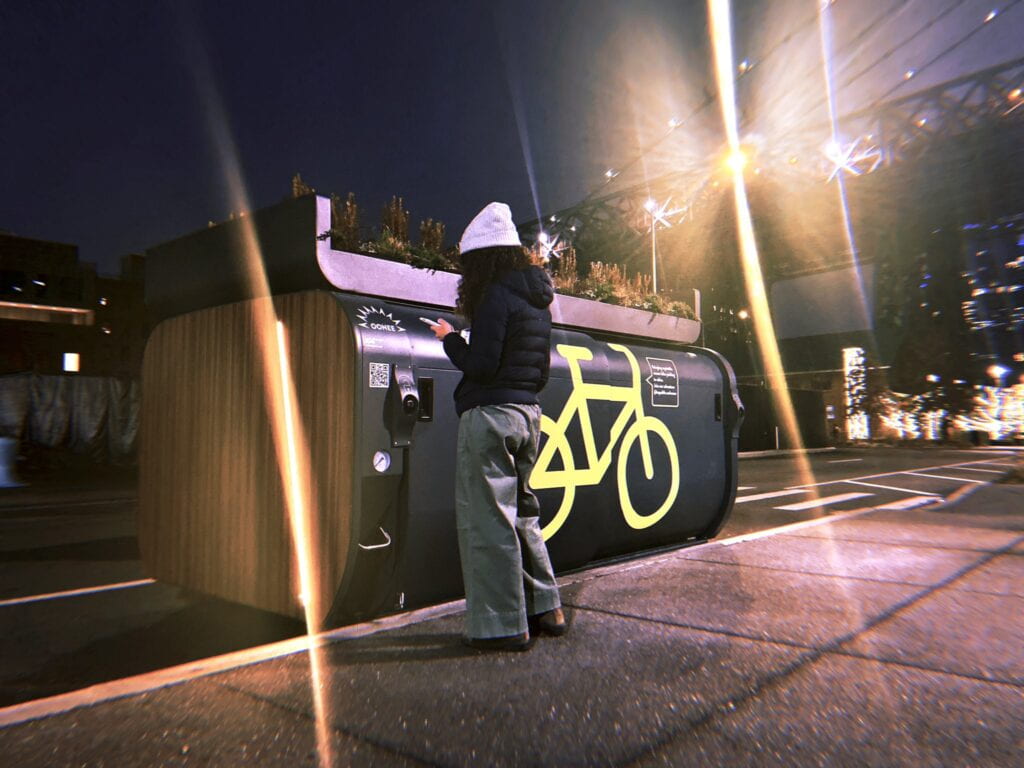In under four months, the startup Oonee raised over $1 million in small donations on the crowdsource-investing site Republic, becoming one of the first Black-led startups to reach that milestone. Oonee (pronounced “Ooh-nee”) is a social impact company that builds bike parking infrastructure networks made up of secure pods that bikers can unlock for free with a keycard or smartphone.

Shabazz Stuart, one of Oonee’s founders, turned to Republic after underwhelming initial conversations with investors. “Let’s just say people weren’t jumping up and down,” Stuart said. While some venture capitalists thought they were crazy or naive, community members invested – both financially and figuratively – in Oonee’s vision. Over 1,000 people contributed to the Republic campaign. “We’re excited that we are public and the crowd is part of the formula,” Stuart said. Oonee’s founders aren’t stereotypical businesspeople. The founders are Black and Brown New Yorkers, who Stuart described as “policy folks.” They met working together for the Downtown Brooklyn Partnership and Coro fellows.
Oonee, like its founders, straddles the line between business and policy. On the one hand, they seek profit, and on the other, they have a social mission: creating and operating green public transit infrastructure. Stuart doesn’t see the business and the social mission of Oonee as in conflict. Rather, he believes their innovative approach strikes the balance needed to make an impact. For a tech social impact company, they’ve already deviated from the usual path, embracing an unusual customer base, crowdfunded capital, and unique management structures. Their approach could change how cities do social impact and public-private partnership.
To read more about Oonee’s networks in New York City and Northern New Jersey, read Ben Listman’s explainer.
They started as any good policy team might: with a survey. The original idea was a subscription service where subscribers gained access to the bike network. Their first poll investigated how much people would pay for secure bike parking. The answer? “Not much.” Oonee wants to attract leisure bikers, bike commuters, and working cyclists, like delivery workers, not all of whom may be willing or able to pay a subscription. So Oonee decided its service needed to be free. Already, the lines blur: it sounds more like a public service than a product.
Yet initial partners in Jersey City and NYC believe there’s a policy gap to be filled and Oonee is betting the market can fill it. Oonee’s users are bikers, but their customers are city governments and government agencies. They’re not only selling bike storage but also transportation policy. “The business,” Stuart said, “is about how to pay for the policy.” Cities pay Oonee to install and operate bike parking infrastructure, working with cities to place their pods where they’re most needed.The city gets infrastructure for residents and Oonee captures economic value, selling ads on their pods.
Social impact ventures have been criticized for underperforming and being under-researched. Empirical evidence on secure bike parking is limited, but research has shown that the presence of bike parking encourages cycling and that cyclists prefer secure, high-quality parking. In New York City, advocates say lack of bike parking has contributed to bike theft and slowed bike use. Impact investing is a $12 trillion dollar business, but many funds don’t measure if they are actually making an impact. Oonee is putting structures in place to make sure they do.
Oonee is assembling an “advisory council”, made up of community members, stakeholders, and former officials, like Janette Sadik-Khan, former Commissioner of the NYC Department of Transportation. Stuart compared the advisory council’s role to that of a newspaper’s ombudsman: a body that can operate in the public interest outside of management. While a board of directors might be the company’s functional management arm, he hopes the advisory council will be the company’s “soul.” The structure mirrors Oonee’s dual mission: profit and impact. The structure is somewhat new to the sector, and untested. Time will tell how strong an oversight role the council plays.
To realize that vision, Ooonee must succeed where other startups in the space have failed: they need to earn the government’s trust. Other transportation tech startups, like Uber and Lyft, and microbility companies like Lime, have had tumultuous relationships with cities. Oonee is trying to learn from their mistakes. “Most companies create their business, and try to get policy to support that business,” said Stuart, “We did the opposite, create a good policy and use business to support it.”
Building trust is about the product – Oonee wants projects with “ribbons people are proud to cut” – but also about the process. They’re approaching business development like urban planners, thinking strategically about how to scale a network equitably and building out advocacy and communications arms to organize constituencies. They built relationships with community leaders, hosted community meetings, and put on events with political leaders like new Mayor Eric Adams. Leading with honesty and authenticity, Stuart hopes they can lubricate the wheels of government to get efficacious policy into the world.
Oonee has taken root in the metropolitan region, announcing a partnership with Jersey City and Metro North. Oonee hopes to lure back some skeptical investors with their fundraising success and, bolstered by crowd funding, accelerate growth while maintaining a trustworthy relationship with partners.
Stuart admits the venture capitalists had something right: Oonee is a bunch of dreamers. But the dreamers are “supremely confident” that the policy they’re selling will encourage greener transportation habits and help solve big challenges like climate change. They’ve built out an innovative company structure to keep them grounded in that mission. The big challenge: can they get private sector conduits to truly work for the public interest?
“What’s on trial is not just Oonee,” said Stuart, “but can capitalism, can a market-based model work for efficacious policy?” If it works, Oonee’s unorthodox business model might be part of the solution.